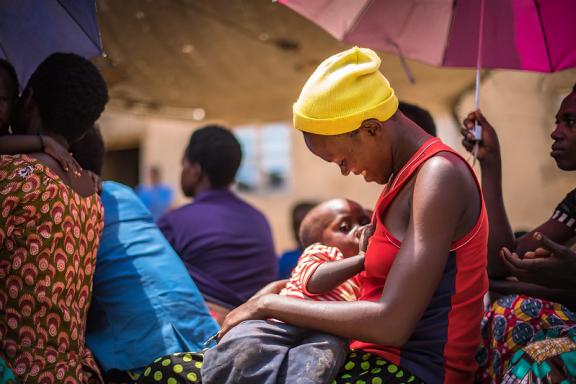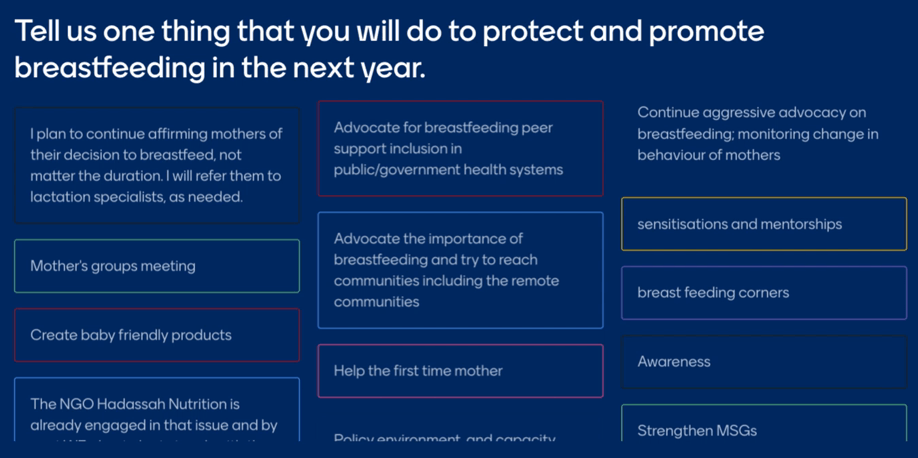
Breastfeeding has the power to save lives, prevent malnutrition, and enhance the long-term health and development of women and children. USAID has proudly supported efforts to promote and protect breastfeeding around the world for over 40 years. For World Breastfeeding Week 2021, we’re spotlighting USAID-supported efforts dedicated to elevating breastfeeding.
On August 5th, we hosted a virtual event with representatives from USAID-supported activities in Uganda, Zambia, Tajikistan, Bangladesh, Lesotho, Nigeria, Yemen, and Ethiopia that spoke to their experiences with promoting and protecting breastfeeding across communities, health systems and in emergency settings.
View the event materials and learn more about what USAID country programs are doing to support breastfeeding.
- Welcome Remarks from Kellie Stewart, Chief of the Nutrition and Environmental Health Division in the Bureau for Global Health:
- Breastfeeding champion, Catherine Kyokunzire, and program participant, Oliver Nzita, share their experiences with nutrition coaching from USAID’s Graduating to Resilience Activity in Uganda:
- Mothers, caregivers, and families need breastfeeding support from the community, health system, and in any setting they may find themselves in. Event participants shared what they will do to protect and promote breastfeeding in the next year:

Webinar Recording
Webinar Resources
- Access the slide deck (PDF, 5.41 MB)
- View webinar transcript (PDF, 319 KB)
USAID Protects and Promotes Breastfeeding Around the World
Uganda
USAID Integrated Community Agriculture and Nutrition Activity in Uganda is working with community groups to maximize economic opportunities for vulnerable households and stabilize their access to and consumption of diverse and nutritious diets. In addition, through village health teams, mothers are encouraged to breastfeed and have support to overcome challenges in continued breastfeeding, especially in the wake of COVID-19.
Zambia
The Scaling Up Nutrition Technical Assistance Project is helping Zambia accelerate progress toward improved nutrition and implement the Zambian government’s Most Critical Days Program. This integrated activity works with the National Food and Nutrition Commission, cross-sectoral coordinating committees at provincial, district, and ward levels, and other donors to provide needs-based capacity strengthening to reduce malnutrition.
Tajikistan
USAID’s Healthy Mother, Healthy Baby Activity supports the Government of Tajikistan’s efforts to improve maternal, newborn, and child health and nutrition. This activity puts communities at the center of their approach to close the knowledge to action gap with social and behavior change efforts at the community and facility level.
Lesotho
USAID’s Reducing Infections through Support and Education (RISE II) project in Lesotho supports antenatal and postnatal women in becoming mentor mothers who then promote a family-centred approach that contributes to a coordinated response for improved HIV & AIDS prevention, care, and treatment. Through health talks on different platforms, HIV positive mothers are empowered to make the best decision to exclusively breastfeed while preventing mother- to-child HIV transmission with access to antiretroviral medicine.
Nigeria
USAID’s Integrated Health Program in Nigeria strengthens health systems and increases access to quality health care for women of reproductive age and children under 5. This includes infant and young child feeding with an emphasis on immediate and exclusive breastfeeding for the first six months in Bauchi, Kebbi, Sokoto, and Ebonyi States and in the Federal Capital Territory. To improve breastfeeding practices, the project builds clinical competencies of government supervisors and primary healthcare workers to support optimal breastfeeding in every ward, the majority of which are located in rural and hard to reach communities.
Bangladesh
USAID’s Ujjiban Project in Bangladesh has been employing a mix of media, outreach, community mobilization, interpersonal communication and local capacity development to increase knowledge and generate awareness of positive health behaviors, including breastfeeding, in the regions of Chattogram and Sylhet in Bangladesh. The project developed an e-Toolkit to assist with breastfeeding counseling, that includes audio-visual materials explaining the do’s and don’ts of infant and young child feeding, early and exclusive breastfeeding, and positioning.
Yemen
USAID’s Yemen Systems, Health, and Resilience Project works to improve maternal and child health outcomes in Yemen via a multifaceted approach. This includes building the capacity of health facility staff and community midwives to deliver higher quality care and encouraging community engagement with the formal health system to build trust for improved breastfeeding counseling and other maternal and child health services.
Ethiopia
Feed the Future Ethiopia’s Growth through Nutrition project aims to improve the nutritional status of women, young children, and adolescents in its four regions of Ethiopia. The project’s multi-sectoral nutrition programming focuses on improving early childhood nutrition during the first 1,000 days, from pregnancy through a child’s second birthday, by promoting good maternal nutrition, optimal breastfeeding, and appropriate complementary feeding, among other infant and young child feeding behaviors.